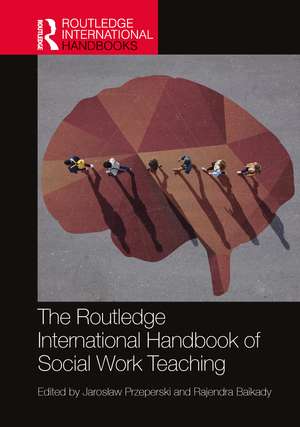The Routledge International Handbook of Social Work Teaching
Editat de Jarosław Przeperski, Rajendra Baikadyen Limba Engleză Hardback – 9 apr 2024
The volume:
- Examines key concepts that underpin debates concerning social work teaching, research, and practice
- Brings out key concerns, debates, and narratives concerning various teaching, learning, and pedagogical methods from different countries
- Documents principal perspectives of different stakeholders involved in social work education – from educators and practitioners to novice social workers
Preț: 1572.60 lei
Preț vechi: 1917.79 lei
-18% Nou
Puncte Express: 2359
Preț estimativ în valută:
300.92€ • 314.82$ • 249.97£
300.92€ • 314.82$ • 249.97£
Carte tipărită la comandă
Livrare economică 03-17 aprilie
Preluare comenzi: 021 569.72.76
Specificații
ISBN-13: 9781032727622
ISBN-10: 1032727624
Pagini: 592
Ilustrații: 16
Dimensiuni: 174 x 246 x 32 mm
Greutate: 1.25 kg
Ediția:1
Editura: Taylor & Francis
Colecția Routledge
Locul publicării:Oxford, United Kingdom
ISBN-10: 1032727624
Pagini: 592
Ilustrații: 16
Dimensiuni: 174 x 246 x 32 mm
Greutate: 1.25 kg
Ediția:1
Editura: Taylor & Francis
Colecția Routledge
Locul publicării:Oxford, United Kingdom
Public țintă
PostgraduateCuprins
Introduction: Teaching Social Work in Contemporary Global Society Section I: The future of teaching social work 1. “Your voice deserves to be heard”: Promoting user’s involvement in social work training 2. A Dialogue Approach to Teaching Social Work Research: Experience, dialogue, meaningful research and publication 3. Artificial intelligence in social work education 4. Digital Portfolios and the Future of Social Work Education 5. Golden threads of connection 6. How do we prepare students for the challenges of social work and what can we learn from each other? Examples from six countries around the world 7. Social Work Education: Future prospects in teaching programmes in Chile 8. Teaching Social Problems in the Social Work: Perspectives from India and China 9. Teaching risk assessment and management skills to social work students using virtual reality simulations Section II: Educational leadership in social work 10. Culture-specific Higher Education Didactics for Social Work Management 11. Model-building as theorizing in social work practice: the university of the Philippines integrative and innovative interventions MSW program model 12. Teaching Leadership in Social Work Section III: Sustainability in social work education 13. Challenges for Social Work Education in the USA and the Czech Republic - Similarities and Differences 14. Evidence based practice and social work: Developing critically engaged research minded practitioners through enhancing research methods teaching 15. Preparing social work graduates for transformative engagement with mental health systems 16. Promoting emotional intelligence in social work students 17. Reflective practice in social work education: learning from “difficult” experiences in field practice 18. Teaching social policies as part of the social work education. 19. Using social work practice skills to teach the practice of social work: Promoting students’ development into competent beginning social workers. 20. When users lead the way… Reflecting critically on our teaching in the light of SDG. Experiences from two Spanish universities Section IV: Remote teaching, learning, and collaboration 21. Social work students and supervisors’ perception of remote field practice learning during the COVID-19 pandemic in Greece 22. Remote teaching in Social Work during pandemics in Georgia 23. Addressing othering in online social work education 24. Hybrid systems of social work education in the midst of COVID-19: Perspectives from the Global South Section V: Lifelong learning in social work 25. Lifelong learning between social workers in Cyprus 26. Lifelong learning: Education for Supervisors and its’ Benefits 27. Lifelong learning in social work between professional identity and professional regulation 28. Preparing adults to be community workers: what lessons should Ukrainian educators learn? 29. Teaching Interprofessional Collaboration in Social Work Section VI: Refining inequality in social work education 30. How to Pave the Streets in Gold 31. An Evaluation of Inequalities in Social Work Education in Turkey 32. Cultural sensitivity and social work within the multi-cultural landscape of Sri Lanka 33. Teaching and learning processes within English Medium Instruction social work education environments 34. Supporting a social work student with a complex reasonable adjustment plan
Notă biografică
Jarosław Przeperski is an Assistant Professor in the Faculty of Philosophy and Social Sciences and the Director of the Centre for Family Research at Nicolaus Copernicus University in Toruń, Poland. His research interests include family transitions and risk, family policies, demographic processes, child and family social work, decision-making processes, and behavioral public policies. Dr. Przeperski has authored over a dozen publications in international journals and has edited publications and book series with Oxford University Press, Routledge, and Springer. He is an expert adviser and principal researcher for projects conducted for the Ministry of Family Affairs, the Ministry of Justice and the Chancellery of the President of the Republic of Poland.
Rajendra Baikady is Assistant Professor, Department of Social Work, Central University of Kerala, India, and Founding Editor-in-Chief of Discover Global Society, an international journal.
Rajendra Baikady is Assistant Professor, Department of Social Work, Central University of Kerala, India, and Founding Editor-in-Chief of Discover Global Society, an international journal.
Descriere
This handbook is a comprehensive text on social work education based on the narratives of social work educators, practitioners and researchers from around the world.
